Marlow Lock
Marlow Lock is a lock and weir situated on the River Thames in the town of Marlow, Buckinghamshire, England, about 300m downstream of Marlow Bridge. The first pound lock was built by the Thames Navigation Commission in 1773.
| Marlow Lock | |
|---|---|
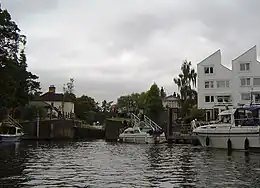 Marlow Lock from downstream | |
| Waterway | River Thames |
| County | Buckinghamshire |
| Maintained by | Environment Agency |
| Operation | Hydraulic |
| First built | 1773 |
| Latest built | 1927 |
| Length | 46.10 m (151 ft 3 in) [1] |
| Width | 6.07 m (19 ft 11 in)[1] |
| Fall | 2.16 m (7 ft 1 in)[1] |
| Above sea level | 88' |
| Distance to Teddington Lock | 37 miles |
Marlow Lock | |||||||||||||||||||||||||||||||||||||||||||||||||||||||||||||||||||||||||||||||||||||||||||||||||||||||||||||||||||||||
|---|---|---|---|---|---|---|---|---|---|---|---|---|---|---|---|---|---|---|---|---|---|---|---|---|---|---|---|---|---|---|---|---|---|---|---|---|---|---|---|---|---|---|---|---|---|---|---|---|---|---|---|---|---|---|---|---|---|---|---|---|---|---|---|---|---|---|---|---|---|---|---|---|---|---|---|---|---|---|---|---|---|---|---|---|---|---|---|---|---|---|---|---|---|---|---|---|---|---|---|---|---|---|---|---|---|---|---|---|---|---|---|---|---|---|---|---|---|---|---|
| |||||||||||||||||||||||||||||||||||||||||||||||||||||||||||||||||||||||||||||||||||||||||||||||||||||||||||||||||||||||
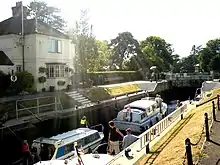
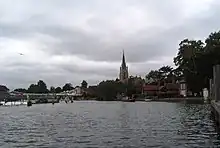
The weir stretches a long way upstream above the lock.
History

A weir at Marlow is recorded in Domesday book, and there are 14th century records of a winch to pull traffic through a flash lock. The lock was very problematical and in the 16th and 17th century there are accounts of conflicts between millers and navigators. A particular problem was the shallow draught. The first pound lock was built of fir in 1773, the seventh downstream of the eight built after the 1770 navigation act. It was upstream of the present lock and still proved problematical. Rollers were needed to guide barges in, and as there was no towpath, barges needed tow ropes several hundred feet long. The lock needed extensive repairs in 1780 and a year later eel bucks had to be removed from the flash lock in case it was needed. The first lock house was erected in 1815 and in 1825 the lock was reconstructed on its present site of Headington stone. The weir was rebuilt in 1872.[2] The last rebuilding of the lock occurred in 1927.
Access to the lock
The lock is easily accessible, being located on the town side, accessed via a short footpath off Mill Lane. In Marlow town the Thames Path passes through town back streets including Mill Lane, so the short diversion is required to visit the lock.
Reach above the lock
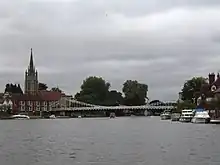
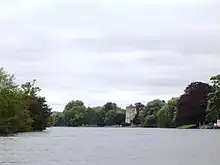
The long weir stretches several hundred yards above the lock, and beyond it is Marlow suspension bridge close to the church. Once the river leaves the Marlow, it curls through hills and beechwoods. On the Berkshire side is Bisham Abbey, a fine old mansion associated with Anne of Cleves and Queen Elizabeth that is now one of the National Sports Centres. Further upstream is the church of Bisham itself.
Temple Mill Island is just downstream of Temple Lock.
Temple Regatta takes place in early May between Marlow Bridge and Temple Lock, and Marlow Town Regatta is held in June.
Sports clubs
Thames Path
After diverting from the river about 200m downstream of the lock, the Thames Path runs through town back streets, passing just north of the lock in Mill Lane. The path rejoins the river at Marlow Bridge. It does not cross the bridge, but passes through Higginson Park and continues on the Bucks side to Temple Lock.
Literature and the media
The poet Percy Bysshe Shelley lived in Marlow and spent much of his time on the river above the lock in a skiff. It was during this time that he composed The Revolt of Islam.[3]
The lock was used in 1970 to film the scene in The Ambassadors of Death, when Liz Shaw is chased onto the weir.[4]
References
- "Environment Agency Dimensions of locks on the River Thames". web page. Environmental Agency. 8 November 2012. Retrieved 18 November 2012. Dimensions given in metres
- Fred. S. Thacker The Thames Highway: Volume II Locks and Weirs 1920 - republished 1968 David & Charles
- Thomas Medwin The Life of Percy Bysshe Shelley
- Mulkern, Patrick. "The Ambassadors of Death". Radio Times. Retrieved 14 March 2021.
- "Environment Agency Distances between locks on the River Thames". web page. Environmental Agency. 19 November 2012. Retrieved 21 November 2012. Distances given in km